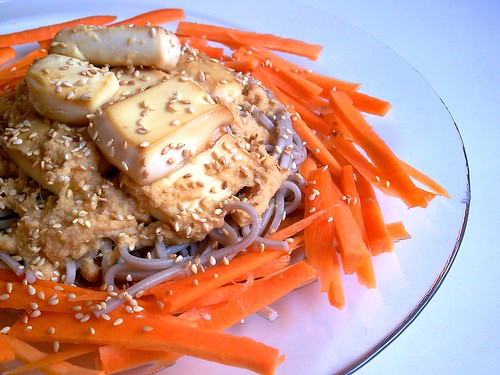
Ingredients:
100 g soba
100 g soba
1 tbsp minced ginger
1 tbsp sesame oil
1 tbsp lime juice
1 tbsp soysauce
100 g baked or smoked tofu
1 carrot, sliced finely
1 tbsp sesame seeds, toasted
Directions:
1) Cook soba according to package instructions. Rinse in cold water after cooking.
2) Blend minced ginger, sesame oil, lime juice and soysauce together.
3) Toss soba with tofu, carrot and sprinkle with sesame seeds. Serve.
Remarks:
A quick sort of the recipes stashed in my "Recipe" folder landed me into a situation that I'm all too familiar with - the desire to cook! This one's from a recipe book that emphasizes on healthy ingredients to produce tantalising dishes with low glycemic load as well as low propensity in allergy-induction.
However much a fan of ginger (and ginger cats, see below), I didn't take to the ginger paste that I got from step 2. The sesame couldn't stand out, for the sauce was too overwhelming with the spiciness of the tuber. I would suggest cutting down the ginger to 1/2 tbsp and using the juice instead of the paste. The lime complemented the ginger well nevertheless.
I am forever catching sight of adorable cats living in lethargy. Can I join you too oh ginger Kitty?
Anyway, I've borrowed "The Food Doctor: Healing foods for mind and body", a book which comes packed with nutrition advice and healthy recipes. It has sections dedicated to different common ailments such as arthritis, migraine, digestive disorders etc, and presents foods with healing properties to help alleviate the conditions. Here's a short extract from the section: Energy and Emotions: Foods for Memory and Concentration:
An easy read, and very informative. I think that "simple" ingredients are not as simple as stated to be though, since I don't get to see them (brewer's yeast? calf's liver?) often in the supermarket. If you are free, do drop by the library to grab a copy. You'll be amazed at how much you can heal yourself through proper diet.
2) Blend minced ginger, sesame oil, lime juice and soysauce together.
3) Toss soba with tofu, carrot and sprinkle with sesame seeds. Serve.
Remarks:
A quick sort of the recipes stashed in my "Recipe" folder landed me into a situation that I'm all too familiar with - the desire to cook! This one's from a recipe book that emphasizes on healthy ingredients to produce tantalising dishes with low glycemic load as well as low propensity in allergy-induction.
However much a fan of ginger (and ginger cats, see below), I didn't take to the ginger paste that I got from step 2. The sesame couldn't stand out, for the sauce was too overwhelming with the spiciness of the tuber. I would suggest cutting down the ginger to 1/2 tbsp and using the juice instead of the paste. The lime complemented the ginger well nevertheless.
I am forever catching sight of adorable cats living in lethargy. Can I join you too oh ginger Kitty?
Anyway, I've borrowed "The Food Doctor: Healing foods for mind and body", a book which comes packed with nutrition advice and healthy recipes. It has sections dedicated to different common ailments such as arthritis, migraine, digestive disorders etc, and presents foods with healing properties to help alleviate the conditions. Here's a short extract from the section: Energy and Emotions: Foods for Memory and Concentration:
~~~~~~~~~~~~~~~~~~~~
Whether you're studying hard for exams, spending 10 hours a day in the office, making a presentation, driving a car, or carrying out any activity that requires concentrated brain effort, the food you eat throughout the day will have a direct effect on your ability to concentrate and remember things.
- Brain cells require choline, a B vitamin, for optimal function. Once prsent in the brain, it is transformed into acetylcholine, a neurotransmitter responsible for sending information from one brain cell to the next. Low levels of acetyl choline cause loss of memory in varying degrees - from the "It's on the tip of my tongue...", to complete forgetful ness. Choline is also required for the formation and maintenance of the myelin sheath that protects the nerve cells, ensuring rapid and accurate transmission of information.
Choline-rich foods include calf's liver, cabbage, cauliflower, cavier, eggs, lentils and soya products, including tofu.
- Another neurotransmitter, dopamine, requires vitamin B3 and iron for its formation. Dopamine is involved in the laying down and maintenance of memory.
Good food sources of B3 are brewer's yeast, turkey, halibut, pumpkin seeds and peanuts. Iron-rich food include calf's liver, apricots (particularly when dried), raisins, pumpkin seeds and walnuts.
- The B-complex vitamins (B1, B2, B3, B5, B6, B12, biotin and B9, folic acid) are all required for memory maintenance. Signs of deficiency in these vitamins include memory loss, poor concentration, impaired learning and general forgetfulness. B-complex vitamins are essential for the production of cellular energy - and nowhere more than in the brain cells.
Good food sources include brewer's yeast, chicken, collards, kale, oatmeal, soya beans, fish, avocados and potatoes.
An easy read, and very informative. I think that "simple" ingredients are not as simple as stated to be though, since I don't get to see them (brewer's yeast? calf's liver?) often in the supermarket. If you are free, do drop by the library to grab a copy. You'll be amazed at how much you can heal yourself through proper diet.




No comments:
Post a Comment